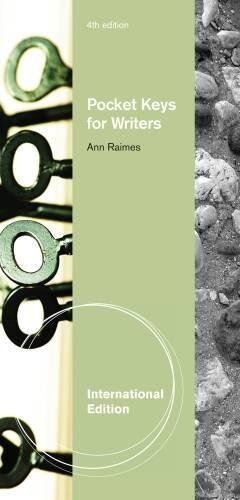Artículos relacionados a Pocket Keys for Writers, International Edition

Críticas:
PART I: Writing in College. 1. The Reading and Writing Process. 2. What Do Readers Expect in Your Writing?. A clear purpose and audience. A clear main idea. A conversation with sources and ideas. Revised and polished writing. Standard Written English. The issue of I in academic writing. 3. Is Your Argument Convincing?. Critical thinking. A debatable claim (thesis). Reasons and evidence. Areas of common ground. Visuals. Model paper 1: A student's argument essay (MLA). 4. Presentation Matters. In print. Online. Text (color, lists, headings). Photos and images. Data (tables, graphs, charts). Oral and multimedia presentations, PowerPoint, e-portfolios. Multimodal composition. PART II: Research: Finding and Evaluating Sources. 5. How to Search for Information. Source material and collecting primary data. Print and online sources. Visual sources. Starting points. Keyword searching. Google. Online alerts. 6. How to Recognize a Scholarly Article. Print articles. Online articles. 7. How to Evaluate Sources. Print sources. Online sources. Basic information on Web sites. PART III: Using and Citing Sources: Writing without Plagiarizing. 8. Citing Your Sources. Why, what, and how to cite sources. Boundaries of a source citation. Avoiding plagiarism. Keeping track of sources. Bibliographic software, databases, and Word 2007. 9. How to Use and Integrate Source Material. Organization with ideas, not sources. Summarizing and paraphrasing. Quoting. Integrating source citations. PART IV: Documenting Sources. 10. MLA Style. Index of MLA Style. Basic features. Citing sources. MLA list of works cited. Print books (Source Shot 1). Print articles (Source Shot 2). Online databases (Source Shot 3). Web sources. Visual, performance, multimedia, miscellaneous sources. Model paper 2: A student's research paper, MLA style. 11. APA Style. Index of APA Style. Basic features. Citing sources. List of references. Print books and parts of books. Print articles (Source Shot 4). Online sources (Source Shot). Visual, multimedia, miscellaneous sources. Model paper 3: A student's research paper, APA style. 12. Chicago Style. Index of Chicago Style. Basic features. Citing sources. Endnotes and footnotes. Print books. Print articles. Online sources. Audiovisual, multimedia, miscellaneous sources. A student's Chicago bibliography. Model paper 4: Samples from a student's Chicago research paper. PART V: The Five C's for Clear Style. 13. Cut. Wordiness. Formulaic phrases. References to your intentions. 14. Check for Action ("Who's Doing What?"). "Who's doing what?". Sentences beginning with there or it. Unnecessary passive voice. 15. Connect. Consistent subjects. Transitional words. Variety in connecting ideas. 16. Commit. Confident stance. Consistent tone. 17. Choose Your Words Carefully. Vivid and specific words. Slang, regionalisms, and jargon. Biased and exclusionary language. PART VI: Common Sentence Problems. 18. FAQs about Sentences. 19. Fixing a Sentence Fragment. What a sentence needs. Turning fragments into sentences. Beginning with and, but, or or. Intentional fragments. 20. Fixing a run-on or comma splice. Identifying. Correcting. 21. Untangling Sentence Snarls. Mixed constructions, faulty comparisons, convoluted syntax. Misplaced modifiers. Dangling modifiers. Shifts. Logical sequence after the subject. Parallel structures. Is when and the reason is because. Necessary and unnecessary words. 22. Using Verbs Correctly. Verb in Standard Written English. Auxiliary verbs. Verbs commonly confused. Verb tenses. -ed forms (past tense, past participle). Conditional sentences, wishes, requests, demands, recommendations. Active and passive voices. 23. Making Subjects and Verbs Agree. Basic principles. Words between subject and verb. Subject following the verb. Eight tricky subjects. Collective nouns (family, etc.). Compound subjects (and, or, nor). Indefinite pronouns (anyone, etc.). Expressing quantity (much, etc.). Relative clauses (who, which, that). 24. Using Pronouns. Which to use (I/me, he/him, etc.). Specific antecedent. Agreeing with antecedents. Using you. Relative pronouns (who, whom, which, that). 25. Adjectives and Adverbs. Forms. When to use. Hyphenated (compound) adjectives. Double negatives. Comparatives and superlatives. PART VII: Punctuation and Mechanics. 26. Punctuation Shows Intent. 27. Commas. 28. Apostrophes. 29. Quotation Marks. 30. Other Punctuation Marks. 31. Italics and Underlining. 32. Capitals, Abbreviations, and Numbers. 33. Hyphens. 34. Online Guidelines. PART VIII: Writing across Languages and Cultures. 35. Standard Written English. Cultures and Englishes. Spoken varieties and Standard Written English. 36. Nouns and Articles (a, an, the). Types of nouns. Basic rules. The for specific reference. Four questions to ask about articles. 37. Infinitive, -ing, and -ed Forms. Verb + infinitive. Verb + -ing. Preposition + -ing. Verb + infinitive or -ing. -ing or -ed adjectives. 38. Sentence Structure and Word Order. Basic rules. Direct and indirect objects. Direct and indirect questions. Although and because clauses. PART IX: Words to Watch For. 39. Glossary of Usage. Index. Editing Marks.
Reseña del editor:
POCKET KEYS FOR WRITERS, 4E, International Edition gives students big writing help in a small package. This indispensable pocket-style handbook covers the essentials of the writing process--taking students through the research process to the mechanics of writing and using punctuation to the evaluation and documentation of both print and electronic source materials. Concise, up-to-date, and practical, this edition is easier to use than ever before, designed to help students find the material they need when they need it. This edition of POCKET KEYS FOR WRITERS features an increased focus on academic writing and includes a new chapter on the writing process and new sections on multimodal composition. It teaches students how to find, analyze, and cite visual arguments and to create multimedia arguments. A gatefold at the back of the text offers a ready reference for students doing research.
"Sobre este título" puede pertenecer a otra edición de este libro.
- EditorialWadsworth Publishing Co Inc
- Año de publicación2011
- ISBN 10 1133307485
- ISBN 13 9781133307488
- EncuadernaciónTapa blanda
- Número de páginas312
- Valoración
(Ningún ejemplar disponible)
Buscar: Crear una peticiónSi conoce el autor y el título del libro pero no lo encuentra en IberLibro, nosotros podemos buscarlo por usted e informarle por e-mail en cuanto el libro esté disponible en nuestras páginas web.
Crear una petición
